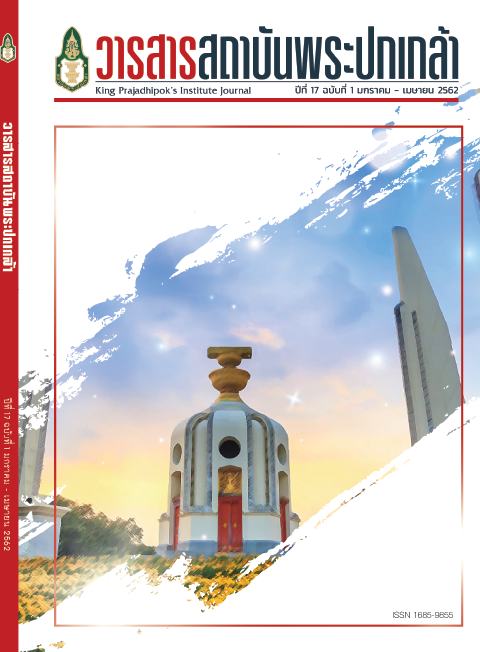The Support for Education Service Liberalization in Thailand
Main Article Content
Abstract
The objectives of the research are to assess the impact of trade liberalization in service sector in ASEAN community and regional economic integration on Thailand’s education service sector, propose international trade negotiation approaches, and recommend measures to support Thailand’s education services adapt to trade liberalization. The study found that Thai government had established national education reform plan and prepared human resource in response to ASEAN community but had not yet formulated modality for opening market in education services. Concurrently, there have been many foreign education businesses penetrating into Thai market, especially in international school, private higher education institutes, and training service subsectors. Thailand must prepare to deal with the trade liberalization for instance, developing human resource, enhancing quality of education institutes to meet international standards, exploiting foreign investment in transferring technologies, and utilizing the geographic location advantage to attract students from neighboring countries to study in Thailand.
Trade liberalization in service sector is an instrument to elevate the standard of Thai education system. The government should pursue progressive liberalization negotiation approach and not open up to other countries more than the commitments made in ASEAN Framework Agreement in service sector. In addition, Thai educational institutes and international schools should pay attention to quality assurance compliance while the government should provide technical assistance, subsidies for education services, and evelopment schemes for Thai small and medium education service enterprises
Article Details
@ 2020 King Prajadhipok's Institute The Government Complex Commemorating All Right Reserved.
References
Bashir, Sujitha. (2007). Trends in International Trade in Higher Education: Implications and Options for Developing Countries. Washington, D.C. : The World Bank.
Deloitte Access Economics. (2016). The Value of International Education to Australia. Canberra : Australian Government Department of Education and Training.
Edge, Karen and Khamsi, Khatera. (2012). International School Partnership as a Vehicle for Global Education: Student Perspectives. Asia Pacific Journal of Education, 32 (4), pp. 455-72.
Education New Zealand. (2014). NZ International Education Industry: Strategic Roadmap: Final Summary. Ellington : Education New Zealand.
Henard, Fabrice, Diamond, Leslie, and Roseveare, Deborah. (2012). Approaches to Internationalisation and Their Implications for Strategic Management and Institutional Practice. Paris : OECD Higher Education Programe (IMHE).
Lim, Hoe and Saner, Raymond. (2011). Trade in Education Services: Market Opportunities and Risks. Lifelong Learning in Europe Journal, 2011 (1), pp. 10-22.
McGuire, Greg. (2002). Trade in Services – Market Access Opportunities and the Benefits of Liberalization for Developing Economies. Geneva : United Nations.
Mpinganjira Mercy. (2009). Trade Liberalization in Education Services: Opportunities and Risks for SADC Country. Educational Research and Review, 11(4), pp. 553-60.
Raychaudhuri, Ajitava and Prabir De. (2007). Assessing Barriers to Trade in Education Services in Developing Asia - Pacific Countries: An Empirical Exercise, Working Paper 3407. New York : Asia Pacific Research and Training Network on Trade, an initiative of UNESCAP and IDRC, Canada.
Verger, Antoni. (2010). WTO/GATS and the Global Politics of Higher Education. New York : Routledge.


